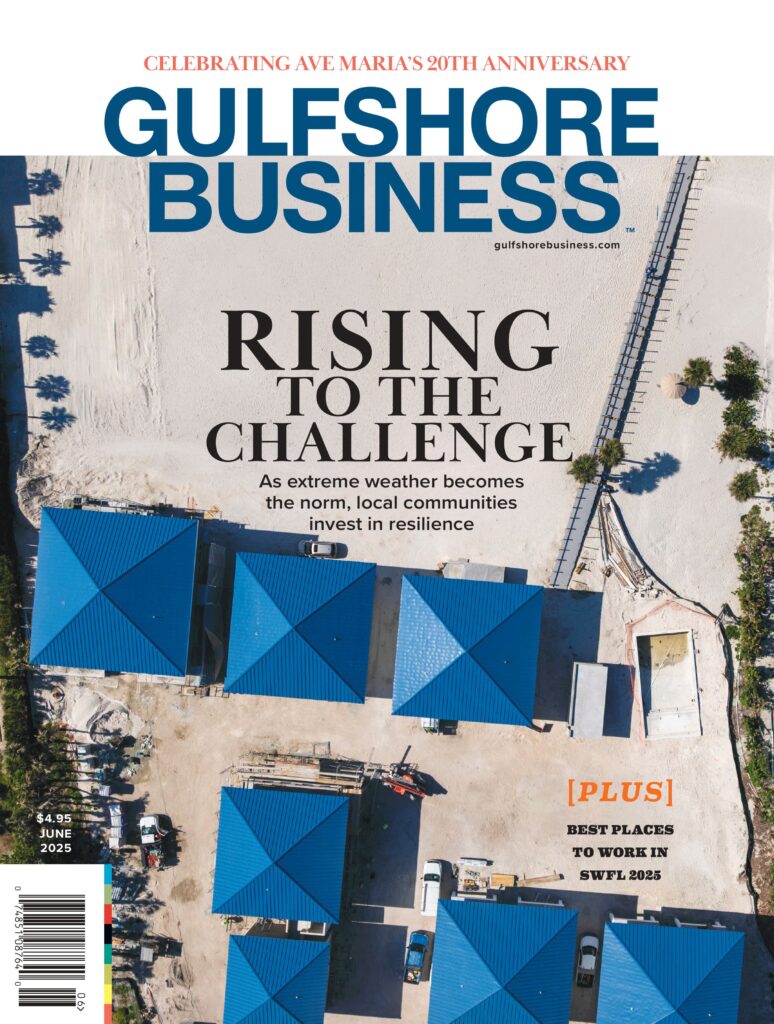Christina Prieto, the manager of a Goodwill store in Naples, runs down a list of about 20 questions when interviewing a prospective employee. The queries are meant to assess how the potential employee would handle different customer situations.
After Jonathan Herr, 30, answered them all, Prieto hired him on the spot.
“He came out and told his dad,” says his mother, Vivian Herr. “And he gave me the biggest hug.”
Not every new employee is excited enough to run out and hug his parents. But not every employee is like Jonathan Herr, either. He is one of more than 2,000 workers in Florida with intellectual or developmental disabilities.
The Equal Employment Opportunity Commission defines intellectual disability as one characterized by significant limitations both in intellectual functioning and in adaptive behavior that affect many everyday social and practical skills.
Developmental disabilities are a group of conditions due to an impairment in physical, learning, language, or behavior areas, according to the U.S. Centers for Disease Control. One of those conditions is autism.
A job at Goodwill had been a good fit for Herr for three years when he and his family lived in Illinois. As the family was planning a move to Naples, they made contact with the Florida Division of Vocational Rehabilitation’s consultant at Goodwill Industries of Southwest Florida, Enas Bendeck, through whom Herr met his future supervisor at the Heritage Bay store in Naples.
According to the 2019 annual Case for Inclusion report by the Ancor Foundation (American Network of Community Options and Resources) and United Cerebral Palsy, Florida ranks last among the states in support for competitive employment, although in overall support for this population—including factors such as health and safety—the state fares better at No. 34.
But just 12 percent of Floridians with intellectual disabilities are working in competitive or integrated jobs, meaning jobs in which they work alongside others without disabilities rather than in sheltered workshops. This number compares with a national average of 19 percent, which actually represents a drop from 24 percent in 2005.
Two problems contribute to this low percentage of workers in community employment. First, there’s a large waiting list for Florida’s Developmental Disabilities Individual Budgeting Medicaid waiver, which allows people to choose which support services they receive, among them housing, therapy, transportation and employment help.
Paid employment also can reduce the amount a worker receives in Social Security Disability Income, depending on how much the employee is paid and the amount of his or her expenses related to employment.
In 2015, the most recent year for which statistics are available, 2,416 intellectually or developmentally disabled people were working or looking for integrated employment, according to Florida’s Agency for Persons with Disabilities, which serves this population.
Nationally, about 2.5 million Americans have an intellectual disability. The majority of adults with an intellectual disability are either unemployed or under- employed, despite their ability, desire and willingness to engage in meaningful work in the community, according to the CDC.
Yet the benefits for businesses that hire these individuals in integrated jobs can be lower employee turnover rates, according to the Florida Department of Economic Opportunity. And that saves businesses money. In 2014, Special Olympics commissioned a Gallup survey on employment of this population and found that of those working in competitive jobs nationally, 62 percent had been at their jobs for three years or more.
Leighton Willis works in the kitchen at Amavida Senior Living in Fort Myers. CEO Colin Marshall is not only pleased with his work, but also is grateful that Losardo isn’t likely to leave the job after being trained.
“Our workers are talented and devoted,” says Madison McNally, program director for the Trailblazer Academy at STARability, formerly the Foundation for the Developmentally Disabled.
“Our goal is to create true inclusion and a positive experience for both the participant and the businesses with whom we connect.”
STARability works with 20 vocational partners, a combination of businesses and nonprofits, says Executive Director Karen Govern. They provide a range of vocational training in fields such as hospitality, restaurants, office clerical, retail, custodial, environmental and animal care, she adds.
Every dollar spent on supported employment services yields a return of $1.46, based on sales and income taxes generated by the worker, according to a study published in 2012 in the Journal of Vocational Rehabiliation. That means supported employment makes economic sense.
It’s also the natural next step after high school for some students.
Project Search is a national program that helps students with intellectually disabilities transition from school to work. Students who are in Lee County’s Exceptional Student Education program and recommended for Project Search by their teachers intern at participating businesses, including Lee Health. The School District of Lee County partners with the Center for Independent Living Gulf Coast and Vocational Rehabilitation of Lee County to provide the job coaches and skills training students need to spend a school year as interns.
Interns from the 3-year-old program have gone on to accept paid employment at Lee Health, LeeSar, Shell Point Retirement Community, Green & Clean Property Solutions, Inc. and other local businesses.
Part of their education is understanding their own disability as well as the disabilities of others they may encounter.
“I know what I’m capable of, and you’re not going to tell me what I can and can’t accomplish,” STARability member and marketing assistant for foundation Matthew Walzer says in an explanatory video for STARabil
Project Search is a national program that helps students with intellectually disabilities transition from school to work. Students who are in Lee County’s Exceptional Student Education program and recommended for Project Search by their teachers intern at participating businesses, including Lee Health. The School District of Lee County partners with the Center for Independent Living Gulf Coast and Vocational Rehabilitation of Lee County to provide the job coaches and skills training students need to spend a school year as interns.
Interns from the 3-year-old program have gone on to accept paid employment at Lee Health, LeeSar, Shell Point Retirement Community, Green & Clean Property Solutions, Inc. and other local businesses.
Part of their education is understanding their own disability as well as the disabilities of others they may encounter.
“I know what I’m capable of, and you’re not going to tell me what I can and can’t accomplish,” STARability member and marketing assistant for foundation Matthew Walzer says in an explanatory video for STARability. “It’s been a great fit for both of us. You feel like you’re serving a purpose, contributing to a common goal, and that’s what any job is, right?
“Every single one of us is here for a reason.” Gulfshore Business spoke with seven of these valuable employees; their profiles follow starting below.
 Tori Georgelos, 24
Tori Georgelos, 24
Tori Georgelos’ family made their vacation home in Naples their permanent residence because of the opportunities that the STARability Foundation gave her, including its employment-centered Trailblazer Academy.
While living near Chicago, Georgelos worked for a hair salon, sweeping, cleaning, restocking shelves, taking drinks to customers and working with the towel laundry, which prepared her for her job here at Air Bar Blowouts and Extensions in Naples.
Since starting her position, Georgelos has earned a raise in pay.

Tori Georgelos performs several duties at Air Bar.
“Everyone at Air Bar loves Tori’s sunny, friendly personality and enthusiasm,” says her mom, Laura Georgelos. “Whenever a team member is in the back room and simply chatting, Tori will remind them, ‘OK, now you need to get back to work!’ They all get a giggle out of her keeping them in line.
“It’s meant the world to Tori to have the opportunity and the camaraderie of a friendly working environment.”
 Zachary Losardo, 21
Zachary Losardo, 21
Nursing supervisor Jeremy Rose explained why Zachary Losardo was a good fit as a patient care liaison at Golisano Children’s Hospital.
“He had the culture of our unit,” Rose says. “He has empathy, he is good with teamwork, listening, and understanding what we do.”
Losardo was an intern first, for about three months, after graduating from Lehigh Senior High School in 2018 and a stint as a volunteer at Germain Arena.
He likes this job, and the best part is “putting a smile on people’s faces,” Losardo says.

Zachary Losardo likes putting smiles on people’s face.
He greets families, cleans toys and counters and organizes cabinets from 8:30 a.m. to 4:30 p.m. Monday through Friday.
He’s come a long way, Rose says. At first, he was very quiet and didn’t make eye contact. “But the longer he’s here, the more confidence you can see in him.”
Rose worked with Losardo on making eye contact with people and developed scripts for him that covered situations he may be in, so he is not at a loss for words.

Shelbi Scott, 22
Shelbi Scott is a quiet young woman with Down syndrome, but that doesn’t keep her from being a reliable worker at Royal Scoop in Bonita Springs.
“Our family has lived only a couple of blocks from Royal Scoop in Bonita Shores for 21 years,” says her mom, Sherri Scott. “We have been friends with David and Sarah Zimmermann, owners of Royal Scoop, since Shelbi was in preschool. Needless to say our history makes it the perfect location and environment for Shelbi [and us] to feel comfortable.”
Shelbi and her job coach from STARability, Halley Kretschmer, work together before the shop opens, putting Royal Scoop labels on cups, filling entrée baskets with checkered paper and straightening the Beanie Boo plush animals on display.

Shelbi Scott has an eye for organization.
“She likes that, and has a good eye for organization,” Kretschmer says.
“The staff is amazing with Shelbi and we absolutely love them all! They treat Shelbi with respect while allowing her the opportunity to be a productive member of their team,” Scott says.
 Joe Shirley, 37
Joe Shirley, 37
Joe Shirley works one day a week for the Naples Art Association, mopping floors and emptying trash. He enjoys both tasks, he says.
Most of the money he makes he saves. But he says he is saving to buy a LEGO Ford Mustang and a Martian Exploration Minifigure Pack.
While we talked, he walked from room to room, checking the trash cans until he was satisfied that they had all been emptied, and then took them outside to the dumpster.

Joe Shirley is not satisfied until the job is done right.
Then he visited the break room to pour himself a lemon-lime soda. “I really like this beverage,” he says.
“We adore him,” says Mary Visgilio, events coordinator for the Naples Art Association.
 Leighton Willis, 22
Leighton Willis, 22
Leighton Willis has worked full time as a dishwasher and prep cook at Amavida Senior Living in Fort Myers for nearly a year.
Before becoming employed, he spent a lot of time in the boxing ring. He still boxes, “to keep in shape,” he says.
His hobby seems in direct contrast to his demeanor, which is gentle and quiet.

Leighton Willis goes about work in a gentle and quiet way.
“We feel that with folks like Leighton, you get individuals who are conscientious, and they care. Their disabilities aren’t an impediment to their performance,” says Amavida CEO Colin Marshall.
Willis came to Amavida, his first job, through Goodwill’s Pathways to Work program. “I love it here. There’s fun people that lives here,” he says.
With his paycheck, he says, he helps his mom out.
Shawn Denton, 44
Shawn Denton went to Cosmos Ristoriante & Pizzeria for about a year for vocational training. Owner Gianluca Cosmo saw a good worker in him and hired him as part of the staff.
Denton rolls silverware, greets and seats customers and gives them menus.
“He has a great work ethic. Great work ethic. I think he’s doing a fantastic job. He’s making coffee now, espresso. Helping me out, bringing the menus to the ta- ble. Customers love him,” Cosmo says.

Shawn Denton makes customers feel welcome.
“He’s a superstar,” says his manager, Juan Thompson. “Every little thing we might miss, he checks up on.”
Shawn says he is saving his paychecks for a vacation to Northern Ireland. His mom, Pat Denton, was born there and Shawn has cousins he has visited and would like to visit again.
Jonathan Herr, 30
His name tag says “Retail Processor,” but Jonathan Herr can do nearly all of the jobs at the Goodwill store on Sage Avenue in Naples. He has worked at the store since late September, three or four full days a week, and can shelve and handle the soft lines (textiles) and hard lines (other goods).
“He’s pretty much the perfect employee,” says his supervisor, Christina Prieto. “Jonathan has a total store focus. He reports to me whatever I need to know … say if a toilet’s backed up, or the truck is here.”

Jonathan Herr is described as “the perfect employee.”
Herr worked at a Goodwill store in Naperville, Illinois, before moving with his parents to Naples. “My manager trained me to be his eyes and ears in the store,” he explained.
He also trained some new employees in Illinois, he says, “some with special needs like myself,” he says.
RELATED: Bridging the gap from school to work for adults with autism







